David Zaslav, Warner Bros. Discovery CEO at the Business And Media Elites Attend Annual Allen & Co Meetings In Sun Valley Kevin Dietsch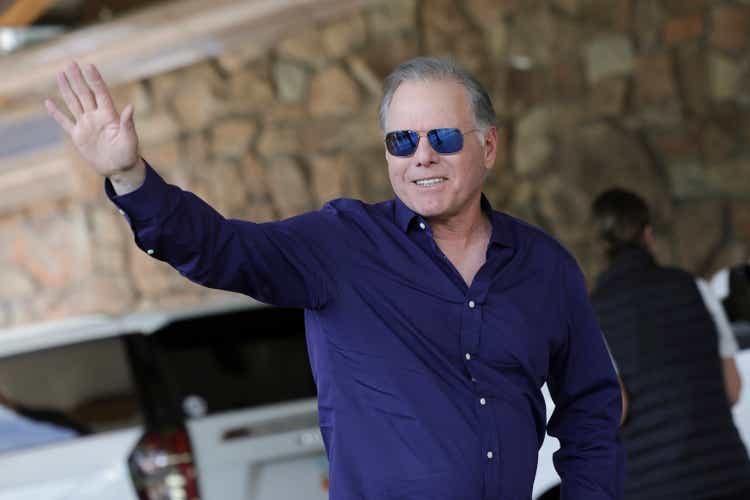
The slogan “It’s Not TV, It’s HBO” has been used for decades to draw a line in the sand differentiating the unique value and quality of an HBO series from everything and anything their competition could come up with. Henceforth it shouldn’t come as that much of a surprise that investors and audiences alike were left shocked by the recently rumored plan of Warner Bros Discovery (NASDAQ:WBD), the parent company of HBO Max, and their potential decision to drop the iconic brand from the name of its streaming service, as reported by CNBC.
HBO likely to this day remains the most prestigious name in the entertainment industry, viewed and perceived through the lens of the so-called “golden era” of television that brought audiences across the world masterpieces including The Wire, Chernobyl, The Sopranos, Game of Thrones and many others. The HBO brand is the closest thing to representing an MOAT in an industry without any. Even in the current age, with David Zaslav at the helm, HBO once again dominated the Emmys with critically acclaimed shows such as Succession and Euphoria. This raises the question, why would any sane management team want to drop its association with the iconic brand, especially given the increasing competition in the space?
I briefly touched on the subject of the new combined service and the issues surrounding management’s potential approach to the challenging question of choosing the right name for the new service, going only as far as suggesting that it is likely in my view that it will be called simply “Max”. This was back in the day when commenting on Warner Bros. Discovery’s lackluster second-quarter earnings release, so not that material to the case. However, given the recent developments, I would like to elaborate on my views that the controversial decision, is in fact a sensible decision that will prove ultimately accretive to shareholder value.
Is it HBO or HBOMax?
Back in April, AT&T (T) spun off its Warner Media division, and subsequently, it merged with the former Discovery, overseeing the formation of a new stand-alone independent streaming and entertainment giant. The deal offered many challenges for David Zaslav and Gunnar, with one of the major hurdles being how do you exactly properly integrate Warner Media’s predominately scripted legacy with Discovery’s mostly non-scripted programming in a combined and cohesive streaming platform?
The idea of running two separate platforms and bundling the services together in a joint offering similar to what Disney (DIS) does was tossed around for a while, but was in the end, shut down amid concerns about the cost-ineffective nature of such an endeavor. Even after paying down $6 billion of debt during the first two quarters, the company is still struggling to deleverage amid a collapsing ad market. On the other end, the combined service is a big step in the right direction concerning the recently upgraded $3.5 billion synergies target. So, if the two services had to be combined under one name, what should they call it? This opens up so many different questions. Collapsing HBO Max under Discovery+ simply makes no sense at all, while doing things the other way around poses a significant risk to an already damaged brand. I would argue that the primal sin in this sense was the decision by the old AT&T executives team to push the then-new streaming service while keeping the HBO name in the first place.
Combined Service Pitch (Q2 ’22 Investor Presentation)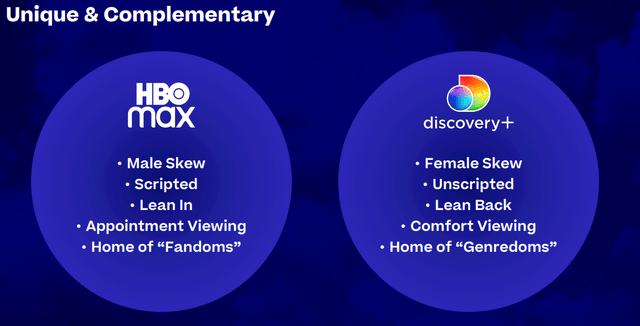
HBO Max was launched in early 2020 with the tagline “Where HBO meets so much more”. Even the marketing phrase tells us that the name was already likely a divisive topic and something that got discussed back and forth prior to lunch, with management ultimately deciding to ride on the back of the iconic HBO brand hoping for a more successful launch. Besides original HBO content as well as movies from New Line and Warner Bros, the deck for the new streaming service has been stacked up with a stream of content from other Warner Media assets such as TNT, TBS, Cartoon Network, Adult Swim, Crunchyroll, Looney Tunes, among many.
This decision led to content like The Sex Lives of College Girls, and Unpregnant Gossip Girl getting released under the HBO brand. The middle ground compromise seems to have been to release premium programming under the HBO brand while titling other content as a “Max” original show. This solution satisfied a few and caused an even deeper crack in the content delivery strategy as well as within the HBO brand itself. Many failed to see any real distinction between the two subbrands, especially given the fact they both released on HBO Max. An additional issue in this sense was that HBO Max failed to properly differentiate itself from legacy HBO, with many assuming it was just “more of the same thing”, instead of a much more in-depth and more costly to-run service for the then-operator.
Warner Bros Discovery Brands (Q2 ’22 Investor Presentation)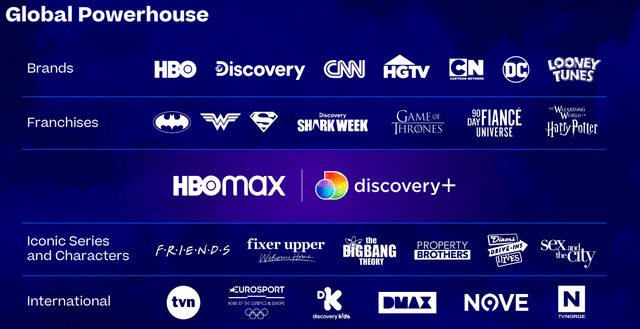
Zaslav and the brand issue at HBO
Now, with the merger being finalized and David Zaslav’s empire of non-scripted content entering the frame only serves to further complicate an already complex situation by raising even more concerns over the integrity of the HBO brand. Former Discovery produced troves of “cheap but profitable” content including 90 Day Fiance, Shark Week, and Naked and Afraid, which perhaps failed to attract significant critical acclaim, but kept audiences engaged and the dollars flowing.
So the dilemma Zaslav and Wiedfielnsen are facing is somewhat simple in nature. They either opt-in to satisfy audiences and investors by keeping the current HBO Max brand for the streaming service, knowingly further degrading one of their greatest assets on the books once referred to by David as the “crown jewel” of Warner Bros. Discovery or move with the terribly unpopular and unquestionably controversial decision to drop HBO from the name.
Subbrands Layout (Disney+ App)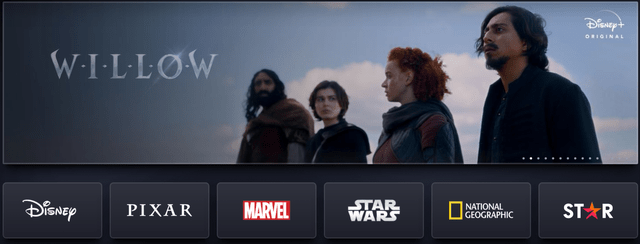
The current vision that is being pitched makes the service look very familiar to Disney+, as the app is likely to share many similarities with the mentioned platform. We already know that in terms of the technology being used, a decision was made to move ahead with the Discovery+ stack for the foundation of the new combined streaming service. The old HBO Max app struggled with multiple performance issues and remained somewhat disliked by users up to this day. The new “Max” streaming service could see tiles of different content categories clearly distinguished from one another, including HBO, Warner Brothers, Cartoon Network, DCU, and Discovery, among other possibilities.
Old debts still haunt them
When discussing potential brand dilution, it is also imperative to tackle the issue of HBO’s struggling international brand recognition. This point is likely going to resonate better with European-based readers, who naturally might be more familiar with the matter. The short version is that legacy Warner Media’s and AT&T’s obligations towards Sky significantly tampered with their footprint in Europe, alongside a couple of other locations in the world. Unlike their rivals like Disney or Netflix (NFLX) who entered the market largely without any major issues, HBO Max was forced to sit on the sidelines and forfeit some of the highest ARPU regions.
In countries such as Germany, Italy, and the United Kingdom, HBO content was exclusively pushed under the Sky umbrella, with users not being able to access the HBO Max site or download the apps up until this day. It is estimated that roughly 200 million people inhabit the three countries in question. Even with a rather conservative 10-15% penetration rate over the next five years, this would mean that the combined service is left without the 20-30 million potential subscribers it could usually have attained, simply due to the short-sightedness of the strategy implemented by former AT&T executives.
Game of Thrones in the U.K. (Sky TV)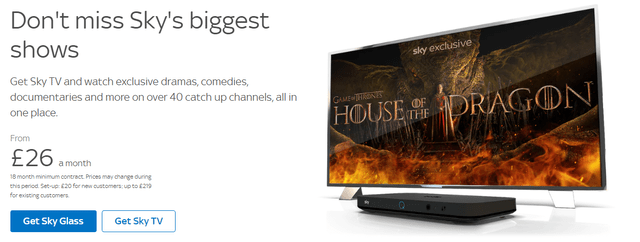
Even more problematic, the new streaming service will not be accessible all the way until 2025, when an exclusive deal between HBO and Sky is set to expire. Even then, it remains an open question if Warner Bros. Discovery will still operate as a stand-alone company, given that the Reverse Morris Trust restrictions expire in late 2024. The even more interesting thing is that Sky happens to be owned by Comcast (CMCSA), a rival the company was rumored to be possibly merging with after the restrictions expire. Here, I do not mean to suggest that HBO is a brand with no recognition outside of the United States, but mean simply to reaffirm that due to past errors in judgment, it does not carry the same weight as in the United States, and as such, a subsequent rebrand to “Max” would be much less problematic with some international audiences.
Closing arguments
We arrive at the only responsible decision given the current circumstances. The streaming service will have to part with the HBO name if management remains serious about preserving the unique quality and assets that HBO represents. This decision is difficult as it will undoubtedly raise many eyebrows as well as attract more criticism to executives who have already struggled to keep their names off the news for the better part of the year. However, in the end, this remains undoubtedly the only acceptable decision that can be made if the long-term interests of both shareholders and fans are to be taken into consideration. Any other decision will ultimately lead down a costly road of further HBO brand degradation and ultimately shareholder value destruction.


Be the first to comment